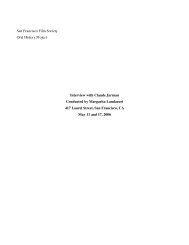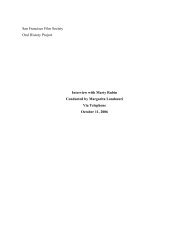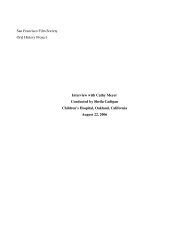Interview with Ernest âChickâ Callenbach - San Francisco Film Society
Interview with Ernest âChickâ Callenbach - San Francisco Film Society
Interview with Ernest âChickâ Callenbach - San Francisco Film Society
Create successful ePaper yourself
Turn your PDF publications into a flip-book with our unique Google optimized e-Paper software.
LEE AMAZONAS: The one thing I had wondered was whether he had even suggested them to Bud<br />
Levin earlier.<br />
ERNEST CALLENBACH: That I’m not sure about.<br />
LEE AMAZONAS: There hadn’t been any. ’65 was the first year. The one thing I wanted to ask was<br />
whether Pauline Kael reviewed the Festival and Festival films on her radio show, if you recall.<br />
ERNEST CALLENBACH: I don’t remember whether she did that explicitly. Perhaps not, because she<br />
was living in Berkeley, up here on Oregon Street and may not have gone to the Festival much. And after<br />
a while, of course, she had the Cinema Guild and Studio to take care of, and that probably would have<br />
occupied all of her available energy. Also, you know, Pauline was not that interested in foreign films.<br />
She was an American film critic. Like Marienbad, for example, until the day she died I think she didn’t<br />
understand why Marienbad was an interesting movie. Also, she appreciated American dialogue—<br />
snappy, short, witty, if possible, back and forth play and so on—and she didn’t appreciate the<br />
languorousness of European cinema by contrast, or Asian cinema, for that matter. She would have gone<br />
crazy at some of these Korean films. But I imagine she must have been sympathetic to the general<br />
establishment of the Festival, and maybe particularly to its attention to avant-garde films. After all, she<br />
had been living, or at least had a child <strong>with</strong> James Broughton, and had helped on one or two of his early<br />
films, and knew about the whole underground film scene in <strong>San</strong> <strong>Francisco</strong> very intimately at the<br />
beginning. But I don’t recall her participating in anything at the Festival. I’m trying to think when she<br />
actually got her job. She wrote probably until ’63 or ’64 or something like that, and I believe that’s when<br />
she got her job at McCall’s and moved east. And after that, we only saw her on rare occasions. The<br />
radio program was a very large cultural force. And I think everybody who listened to KPFA—and that<br />
included practically everybody who was intellectually alive in the Bay Area at that time—really missed<br />
it when she quit in a fit over not being paid. She used to make her living by answering telephones. She<br />
had a telephone answering service, which you could do out of your home. And since she was bringing<br />
up a young daughter, she couldn’t go out to work every day. Her solution was to run a phone answering<br />
service. And nobody was paid at KPFA, but she was their biggest star, and people would be glued to<br />
their radio to listen to these programs that stimulated a lot of intelligent movie-going. Finally she said,<br />
9







